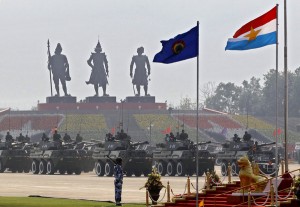Posts Tagged ‘War Crimes’ (25 found)
The Burma Army and Its Language of Aggression
 Mixed messages on the peace process came out this week as the government proposed for the first time to commit a substantial amount of money into the peace process. Yet the Commander-in-Chief of the Armed Forces Senior General Min Aung Hlaing’s inflammatory comments on the indestructibility of the Burma Army and blaming the conflict on the country’s ethnic armed groups expose the attitudes of the country’s most powerful institution. Meanwhile, a second round of formal talks between ethnic armed groups and the government’s Union Peace Working Committee on the nationwide ceasefire accord have been postponed until February as ethnic representatives further discuss the accord.
Mixed messages on the peace process came out this week as the government proposed for the first time to commit a substantial amount of money into the peace process. Yet the Commander-in-Chief of the Armed Forces Senior General Min Aung Hlaing’s inflammatory comments on the indestructibility of the Burma Army and blaming the conflict on the country’s ethnic armed groups expose the attitudes of the country’s most powerful institution. Meanwhile, a second round of formal talks between ethnic armed groups and the government’s Union Peace Working Committee on the nationwide ceasefire accord have been postponed until February as ethnic representatives further discuss the accord.
A local newspaper, True News, published comments made by Senior General Min Aung Hlaing at a briefing to officers in Naypyidaw in November 2013. The language of peace and reconciliation was conspicuously absent in his address, “We made peace agreements, but that doesn’t mean we are afraid to fight. We are afraid of no one. There is no insurgent group we cannot fight or dare not to fight.” The Burma Army chief also states that he intends to follow the path laid down by Senior General Than Shwe, the former head of the military junta that suffocated and terrorized Burma from 1988 to 2011. Burma’s underdevelopment, he adds, is “because of internal insurgents who caused conflict in the country.” […]
13-19 January: The Burma Army and Its Language of Aggression
The full text of this week’s issue of Weekly Highlights, including an analysis of current events and news highlights from inside Burma, the region and internationally, as well opinion pieces, actions, statements, press releases and reports from Burma groups and relevant actors.
• •Press Release on the Ceasefire Announcement at the Laja Yang by the Burmese Government on 18th January 2013
1). The Burmese army continues unjust military offensives in Laja Yang and other parts of Kachinland despite the Burmese government announcing a one-sided deceptive ceasefire applied only to Laja Yang area […]
• • •Burma: Halt Indiscriminate Attacks in Kachin State
The Burmese army appears to have indiscriminately shelled the town of Laiza in northern Burma’s Kachin State in violation of the laws of war, Human Rights Watch said today. Human Rights Watch urged the government to allow humanitarian agencies access to tens of thousands of ethnic Kachin displaced […]
• • •Kachin Organizations/Civil Society Groups Call for Investigation into Burma Army’s War Crimes in Laiza
We, the undersigned Kachin organisations, wish to express our grave concern over the widespread human rights violations being committed by the Burmese army against Kachin civilians, including the ongoing indiscriminate shelling of residential areas of Laiza, which recently led to the death of three civilians aged between 14 and 65, and injury of four others […]
• • •Kachin Deaths A War Crime – Thousands More In Danger
Burma Campaign UK today called on the British government and United States to adopt a much more robust approach with the government of Burma in order to persuade President Thein Sein to halt Burmese Army attacks against the ethnic Kachin minority in Burma […]
• • •The War in Kachin State: A Year of More Displacement and Human Rights Abuses
In the past year, the Tatmadaw has deployed nearly 25% of its battalions to Kachin State, escalating its war with the Kachin Independence Army (KIA) and bringing further suffering to civilian populations in Kachin State and Northern Shan State.
Tatmadaw soldiers have constantly targeted civilians in Kachin State and Northern Shan States as part of their military operations against the KIA. Human rights abuses have included extrajudicial killings, rape of women, arbitrary arrests, torture, forced displacement, the use of human shields, forced labor, and the confiscation and destruction of property. All of these systematic abuses would be considered war crimes and/or crimes against humanity under international law […]
• • •Revisiting Human Rights in Myanmar
On 23 May 2012, Amnesty International concluded its first official visit to Myanmar since 2003. This report illustrates Amnesty’s general impressions of the current human rights situation, and looks at five specific topics: political imprisonment, rule of law, ethnic minorities, accountability, and economic, social and cultural rights.
• • •Annual Report 2012: Myanmar
The government enacted limited political and economic reforms, but human rights violations and violations of international humanitarian law in ethnic minority areas increased during the year. Some of these amounted to crimes against humanity or war crimes […]
• • •Leaflet on Crimes Against Humanity and War Crimes
This leaflet explains in very simple terms what are crimes against humanity and war crimes, including targeted attacks against civilians, deportation or forcible transfer of population, arbitrary imprisonment, torture, murder, rape or other forms of sexual violence, enslavement and enforced disappearance of persons.
Individuals and solidarity organizations are welcome to print and distribute this leaflet to raise public awareness about the ongoing crimes being committed in Burma […]
• • •








 All posts
All posts